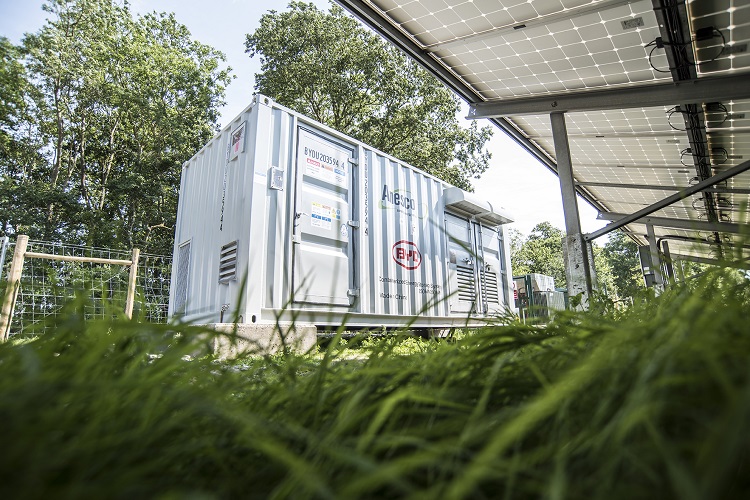A panel is being held in Brussels today by the EU Battery Alliance, which was established last October. In the opening remarks of his speech, Vice-President for Energy Union, Maroš Šefčovič boldly stated that the alliance aims to establish Europe as the global leader in sustainable battery technology.
“Our objective for the Alliance is simple, but the challenge is immense. We want, almost from scratch, to create a competitive and sustainable, battery cell manufacturing in Europe supported by a full EU-based value chain,” he said.
Quoting Sweden's InnoEnergy SE, Šefčovič said that by 2025, the European battery market could be worth up to €250 billion. “Do we want to leave this to our global competitors?” he asked.
The vision is to establish between 10 and 20 giga factories, at a projected investment cost of around €20 billion.
“It has been estimated that the size of the investment required is around €1 billion per 10 GWh. So even if this is not scientific, we would need around 20 billion euros investment. This is a huge investment of course. But it is within our reach (recall 250 billion euros mobilized thanks to the Juncker plan),” said Šefčovič.
He has called on industry to lead this charge, although he said that due to the scale and speed required, a combined effort is required, with “EU institutions, primarily the Commission and the European Investment Bank, and Member States to pool our resources and co-operate to create a supportive framework for this investment.”
Since last October, the alliance said it has already helped to generate considerable traction with concrete projects and actions emerging.
Action points
In a presentation, the alliance outlined seven objectives, including: establishing Europe as the global leader in sustainable battery technology; securing access to sustainably produced battery raw materials at reasonable costs; and creating and supporting new markets.
Eighteen recommendations and 49 actions, including simplifying approval procedures and permitting processes, and financing demo projects, were also identified to achieve these objectives.
At the forum, Sweden’s InnoEnergy SE will discuss the action needed, while Peter Carlsson, CEO of Sweden-based Northvolt, which was recently approved for a European Investment Bank (EIB) loan of up to €52.5 million for a proposed 32 GWh capacity battery storage R&D and production facility in Sweden, is presenting on both the project and current challenges.
Popular content
Holger Gritzka, founder of Terra-E, and Ghislain Lescuyer, chairman of the management board at Saft Groupe S.A. are also providing an overview of projects they are working on.
Šefčovič ended his speech by stating, “…we are now looking into very practical ways forward to create the right conditions for industry investment. This can only be a joint and concerted effort.
Saft forms industry alliance
A day prior to the forum, France-based battery maker, Saft Groupe S.A., which was acquired by French power company Total in 2016, announced it had formed an alliance with Germany’s Siemens AG and Manz AG, and Belgium-based Solvay to launch “an ambitious program of research, development and industrialization for new generations of batteries focusing on advanced high-density Li-ion and Solid-State technology.”
Stating that the new batteries would offer performance, cost and safety advantages compared to current lithium-ion (Li-ion) products, Saft said the next step after development would be to work with industrial partners to develop new manufacturing processes, and cell and system industrilization.
“This will then lead to an easily scalable manufacturing standard block of 1GWh,” it said.
It added, “While this alliance is not exclusive of other agreements or partnerships, the companies will work together over the next seven years to reach the common ambition.
“Throughout the different phases of the project, the core group of the Alliance will partner with European academia, research centers, SMEs, customers and other entities to leverage the wealth of expertise already accumulated throughout Europe.”
Energy storage opportunities in Europe are discussed at length in the forthcoming pv magazine Energy Storage Special, which is published in February and will be distributed at the Energy Storage Europe event in Düsseldorf, held between March 13 – 15.
This content is protected by copyright and may not be reused. If you want to cooperate with us and would like to reuse some of our content, please contact: editors@pv-magazine.com.



4 comments
By submitting this form you agree to pv magazine using your data for the purposes of publishing your comment.
Your personal data will only be disclosed or otherwise transmitted to third parties for the purposes of spam filtering or if this is necessary for technical maintenance of the website. Any other transfer to third parties will not take place unless this is justified on the basis of applicable data protection regulations or if pv magazine is legally obliged to do so.
You may revoke this consent at any time with effect for the future, in which case your personal data will be deleted immediately. Otherwise, your data will be deleted if pv magazine has processed your request or the purpose of data storage is fulfilled.
Further information on data privacy can be found in our Data Protection Policy.